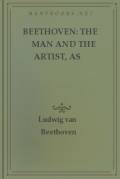搜索结果: 1-10 共查到“音乐学 Beethoven”相关记录10条 . 查询时间(0.046 秒)
Review of William E. Caplin, Classical Form: A Theory of Formal Functions for the Instrumental Music of Haydn, Mozart, and Beethoven
analysis classical style Schoenberg Ratz Formenlehre
2010/3/29
Reviving the Formenlehre tradition as taught by Arnold Schoenberg and Erwin Ratz, Caplin attempts to accommodate the method to a specific but stylistically complex repertory: instrumental works of Hay...
Analysis, Philosophy and the Challenge of Critical Theory:Michael Spitzer’s Music as Philosophy:Adorno and Beethoven’s Late Style
Michael Spitzer Philosophy Music
2009/10/16
Michael Spitzer’s Music as Philosophy: Adorno and Beethoven’s Late Style (Indiana University Press, 2006, ISBN 0-253-34724-6) pursues multiple lines of scholarly enquiry. As a musicological study, the...

《Beethoven:the Man and the Artist,as Revealed in his own Words》(图)
Beethoven:the Man and the Artist,as Revealed in his own Words Ludwig van Beethoven
2009/7/3
This little book came into existence as if it were by chance. The author had devoted himself for a long time to the study of Beethoven and carefully scrutinized all manner of books, publications, manu...

《Beethoven's Letters 1790-1826,Volume 2》(图)
Beethoven's Letters 1790-1826,Volume 2 Ludwig van Beethoven
2009/7/3
Excerpt
im to know it) he is over-fatigued by the injudicious distribution of his lesson hours. Unluckily it is not easy to alter this; so pray, however strict you may be, show him every indulgence,...
Beethoven’s Myth Sympathy: Hollywood’s Re-Construction
Beethoven mass culture Myth Sympathy
2008/10/27
Bernard Rose’s Immortal Beloved: The Untold Love-Story of Ludwig Van Beethoven (1994) is widely regarded as a truly terrible film. Gary Oldman, cast as Beethoven, leads a clichéd and fictional drama t...
Cognitive Dissonance and the Performer’s Inner Conflict: A New Perspective on the First Movement of Beethoven’s Op. 101
cognitive dissonance embodiment image schemata performance analysis Beethoven Op. 101 Robert Hatten
2010/3/25
Much of Beethoven’s music—especially that of the late period—demands that the performer follow interpretive markings that seem to be musically counterintuitive. Conflict between the competing desires ...
Review of Richard Will, The Characteristic Symphony in the Age of Haydn and Beethoven
Richard Will Characteristic Symphony Beethoven
2010/3/25
[1] The nature of the interesting and now unfortunately largely unknown subject matter of this book is perhaps not as readily apparent as it might be, for the title is somewhat ambiguous. This is the ...
"Schenkerian-Schoenbergian Analysis" and Hidden Repetition in the Opening Movement of Beethoven's Piano Sonata Op. 10, No. 1
motive hidden repetition Grundgestalt musical idea, Schenker Schoenberg Beethoven
2010/3/29
A process akin to Schoenberg's "musical idea" accounts to a large degree for motivic coherence in the first movement of Beethoven's Piano Sonata Op. 10, No. 1. My article illustrates this process by m...
Review of Nicolas Marston's Beethoven's Piano Sonata in E, op. 109, Oxford: Clarendon Press, 1995.
Beethoven Schenker
2010/4/21
[1] Nicholas Marston's ten-year-old article in Nineteenth-Century Music on Beethoven's sketches for the Piano Sonata op. 109 has found its logical successor in Marston's new book on the same sonata in...
Beethoven's Op. 81a and the Psychology of Loss
Beethoven Piano Sonata op. 81a program music psychology psychoanalysis
2010/4/22
Two interpretations of the first movement of Beethoven's Piano Sonata in E- flat Major, op. 81a, are offered. According to one interpretation (inspired by Bach's Capriccio on the Departure of His Belo...

